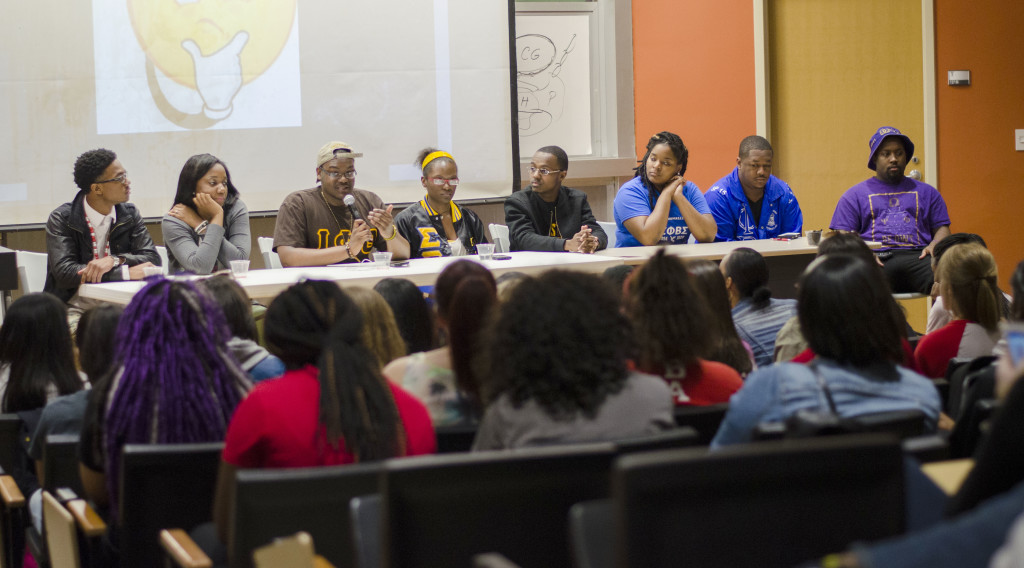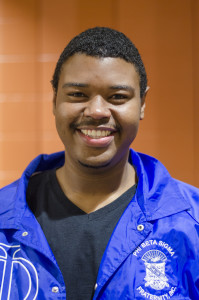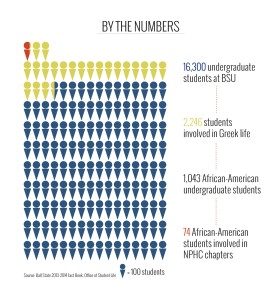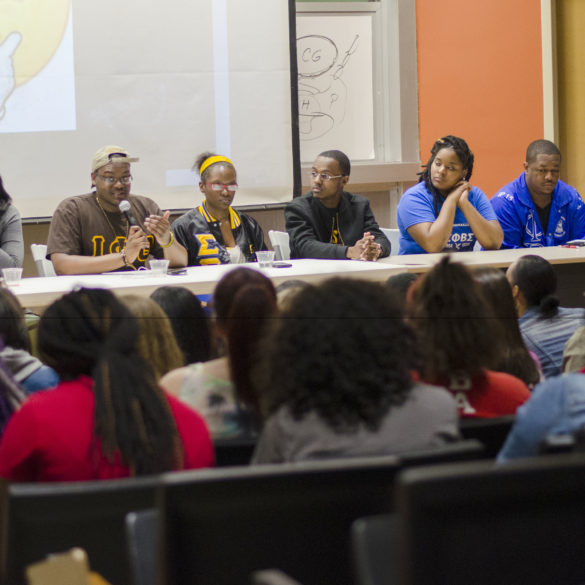By Samantha Bohannon and Dara Metcalfe

Unity. Diversity. Community.
Simple, yet illuminating, these are the main aspects of the National Pan-Hellenic Council (NPHC). A national, historically African-American organization, it represents several fraternities and sororities, known as the Divine 9.
The Divine 9 is split into four sororities and five fraternities: Alpha Kappa Alpha Sorority Inc., Sigma Gamma Rho Sorority Inc., Zeta Phi Beta Sorority Inc., Delta Sigma Theta Sorority Inc., Alpha Phi Alpha Fraternity Inc., Iota Phi Theta Fraternity Inc., Kappa Alpha Psi Fraternity Inc., Phi Beta Sigma Fraternity Inc. and Omega Psi Phi Fraternity Inc.
The only two organizations that have discontinued their charter on Ball State’s campus are Omega Psi Phi and Delta Sigma Theta.
Ball State junior Christa Hammond is the president of Alpha Kappa Alpha, one of the many active chapters of the Divine 9, and has been since fall 2013.

“I believe our organization does two things: we uplift people and we are motivators,” Hammond said. “We’re always doing events for girls. No matter how cliché it is, you’re going to get how much you put out.”
The sorority was founded in January 1908 at Howard University and a chapter became active to Ball State’s campus in 1968.
While organizations belonging to the NPHC usually have African-American members, although those part of the Divine 9 welcome members of any race.
“People think we only take African-Americans, but that’s not true at all,” MaLeah Mitchell, president of Sigma Gamma Rho, said.
As the first chapter to be active at BSU in 1946, Sigma Gamma Rho is a small, but diverse sorority, including students from different backgrounds and can number from 2 to 21 members because of the selective process. However, this is also true for other members of the Divine 9; all of the fraternities and sororities are able to dictate how many members are allowed in their organization.
Even though the matter of joining an NPHC organization is a discreet one, senior Tatyerra Spurlock, member of Alpha Kappa Alpha, said that it all ties into NPHC’s rich, long history.
“It’s always been that way because of the timing [of starting the organizations],” she said. “It’s had to be that way.”
One goal that the NPHC still has yet to reach: branch out to the Pan Hellenic Council (PHC) and InterFraternity Council (IFC) in order to create a more fluidly-working Greek community while still maintaining their independent branch.
“I think now on Ball State’s campus we are all trying to get together instead of saying, ‘Oh, that’s InterFraternity Council or Pan-Hellenic Council or National Pan-Hellenic Council,” Hammond said. “This is [ultimately] Greek life on Ball State’s campus.”
However, the NPHC is also working to not only uplift the BSU community, but the rest of Muncie as well. Various events are held for charity, including March for Dimes and Sigmas Against Cancer. In addition to these events, members are looking to make a name for the small organization.
“I’ve learned you can do service in a multitude of ways, from fundraising to administrative help,” Spurlock said. “That definition [of service] changed for me when I joined [Alpha Kappa Alpha].”

Senior Julian Scott IV, a computer technology major and member of Phi Beta Sigma fraternity, finds that NPHC is unique in its own definition of service.
“I feel NPHC is different from IFC and PHC by the way that we operate,” Scott said. “We hold events that both Greeks and non-Greeks can participate in and also give back to the community through direct service as well as philanthropic events.”
In addition to servicing the community, Spurlock said that keeping Ball State a diverse campus is still important today, and NPHC is a way to help.
“Diversity is important in life and I think a lot of people don’t encounter diversity before college,” she said. “For the real world, you have to deal with it. [Through NPHC] we’re educating people about our history and making them more aware.”
Elijah Bell, historian of Iota Phi Theta, also said that by doing events with NPHC, it will help BSU become a more diverse campus.
“I definitely feel like we will be diverse [in the end],” Bell said. “It will bring diversity because this is what we are looking for. By us pairing with [other] organizations, it brings our name out.”
Scott said that while Ball State is a diverse campus, there is room for improvement.
“I feel that more organizations, whether big or small, should collaborate with each other and give students the opportunity to learn about the multitude of organizations on campus,” Scott said. “NPHC has begun to collaborate with IFC and PHC to host events and I hope that it will continue and help promote that connection.”
Founded during the Civil Rights Movement, Iota Phi Theta was established in 1963 at Morgan State University. They joined BSU’s chapter during spring 2014.
“I think after this year [other organizations will have] grown to know who we are,” said senior Jared Kenslow, president of Iota Phi Theta.
Alpha Phi Alpha was the first Greek organization for African-Americans, established December 1906 at Cornell University; however, the BSU chapter was not active until January 1973 through the Theta Xi chapter. Even still, their motto is “First of All, Servants of All, We Shall Transcend All,” representing the fraternity’s goals of brotherhood and leadership.

Scott was drawn to Phi Beta Sigma his sophomore year through a combination of the brotherhood and community service, which was what led him to become a member.
“Since becoming a member, I have learned many life lessons,” he said. “Most importantly, [I learned] perseverance and to tackle every obstacle by putting forth my best effort.”
For anyone who is interested in being a part of NPHC, Scott has an old and sound piece of advice.
“Whatever organization you choose to join, make sure that is where your heart is and remain true to yourself,” he said. “You should not have to change who you are to become a member of a certain organization. When you read the mission of the organization, it should be like a reflection of your life and what you value.”




